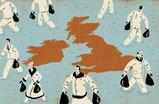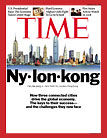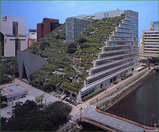Can Microfinance make it in America?

Below is my comment on the article of“Can Microfinance Make It in America?”, page 24-25, TIME Asia issued on January 18, 2010
Your article on the Grameen bank in the U.S. gave me a fresh surprise of the unique relationship between a lender born in Bangladesh, the world’ poorest country and borrowers in the U.S., the world’s richest country. If Grameen’s way of microfinance prevails in the U.S., I feel a foreboding that the new era would come soon when more and more developing countries help the developed ones by their cooperative spirits and minds. Yes, money isn’t everything.
 The start of A Happy New Year became an ominous and uneasy one not only for American passengers but also for others of different nationalities because of only one young bomber on Flight 253. This kind of terrorist attempt reminds me of proliferating cancer cells in a human body. How strong our immune cells become, we can’t prevent those cancer cells from proliferating further permanently because they are also parts of our body, even if they are considered to be evil.
The start of A Happy New Year became an ominous and uneasy one not only for American passengers but also for others of different nationalities because of only one young bomber on Flight 253. This kind of terrorist attempt reminds me of proliferating cancer cells in a human body. How strong our immune cells become, we can’t prevent those cancer cells from proliferating further permanently because they are also parts of our body, even if they are considered to be evil.






 After looking at the photos of your article, I was appalled to know that the impact of China’s Short March seems to be enormously bigger than any suburbanizations that had happened in many advanced economies, especially Japan and the United States for the last several decades.
After looking at the photos of your article, I was appalled to know that the impact of China’s Short March seems to be enormously bigger than any suburbanizations that had happened in many advanced economies, especially Japan and the United States for the last several decades.
 As your article pointed out clearly, the lifespan of cities and towns seems to vary with a certain degree of cycles as that of human beings does. New York, London and Hong Kong came back to life as a unique combined city of Nylongkong after the long debacles of social disorder, bubble burst or bankrupts. The resurgence of those three cities symbolizes the recent tidal wave of globalization in every corner of the earth and the power of greed by the people living and working there to mobilize the big money.
As your article pointed out clearly, the lifespan of cities and towns seems to vary with a certain degree of cycles as that of human beings does. New York, London and Hong Kong came back to life as a unique combined city of Nylongkong after the long debacles of social disorder, bubble burst or bankrupts. The resurgence of those three cities symbolizes the recent tidal wave of globalization in every corner of the earth and the power of greed by the people living and working there to mobilize the big money. 

